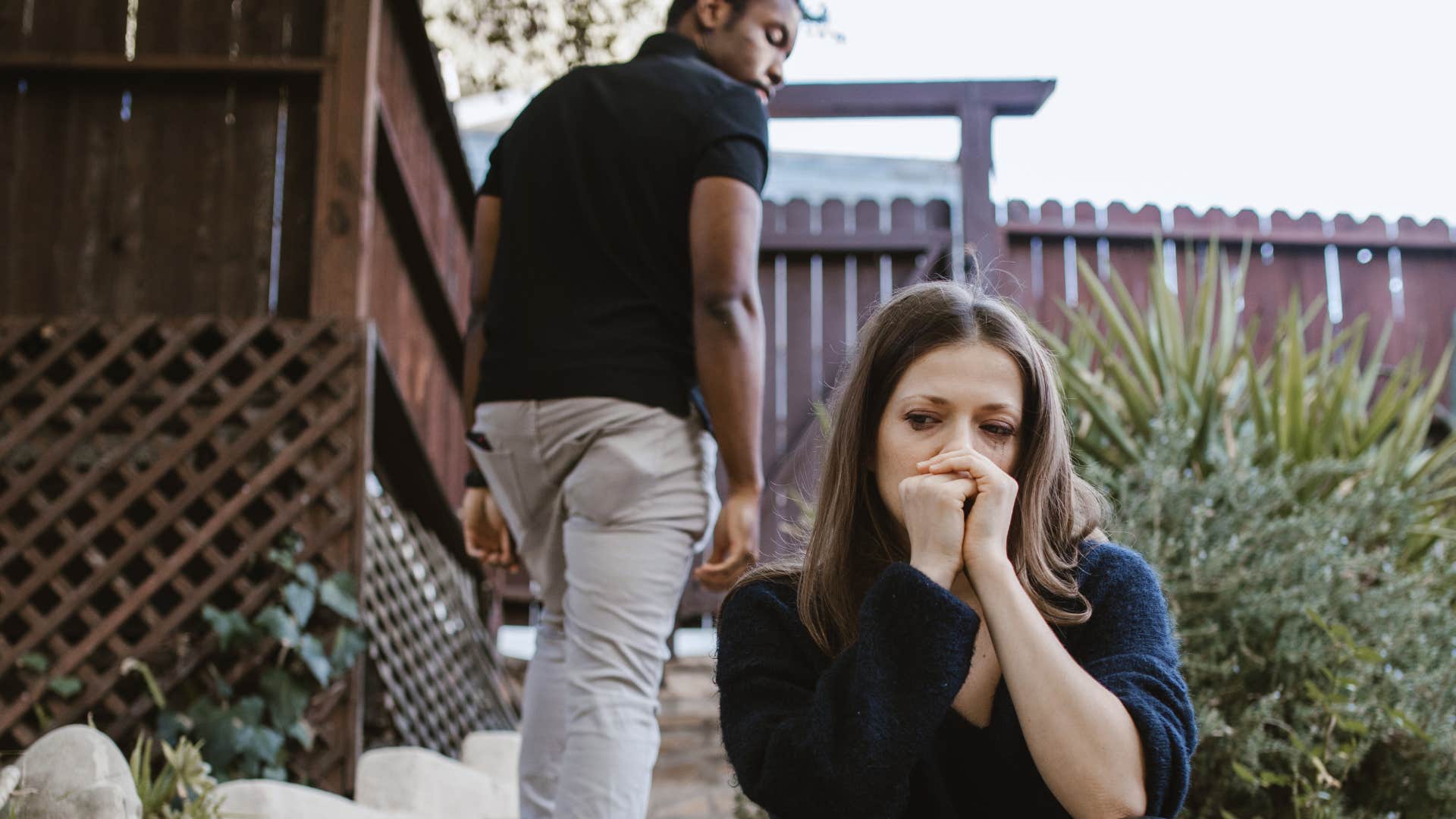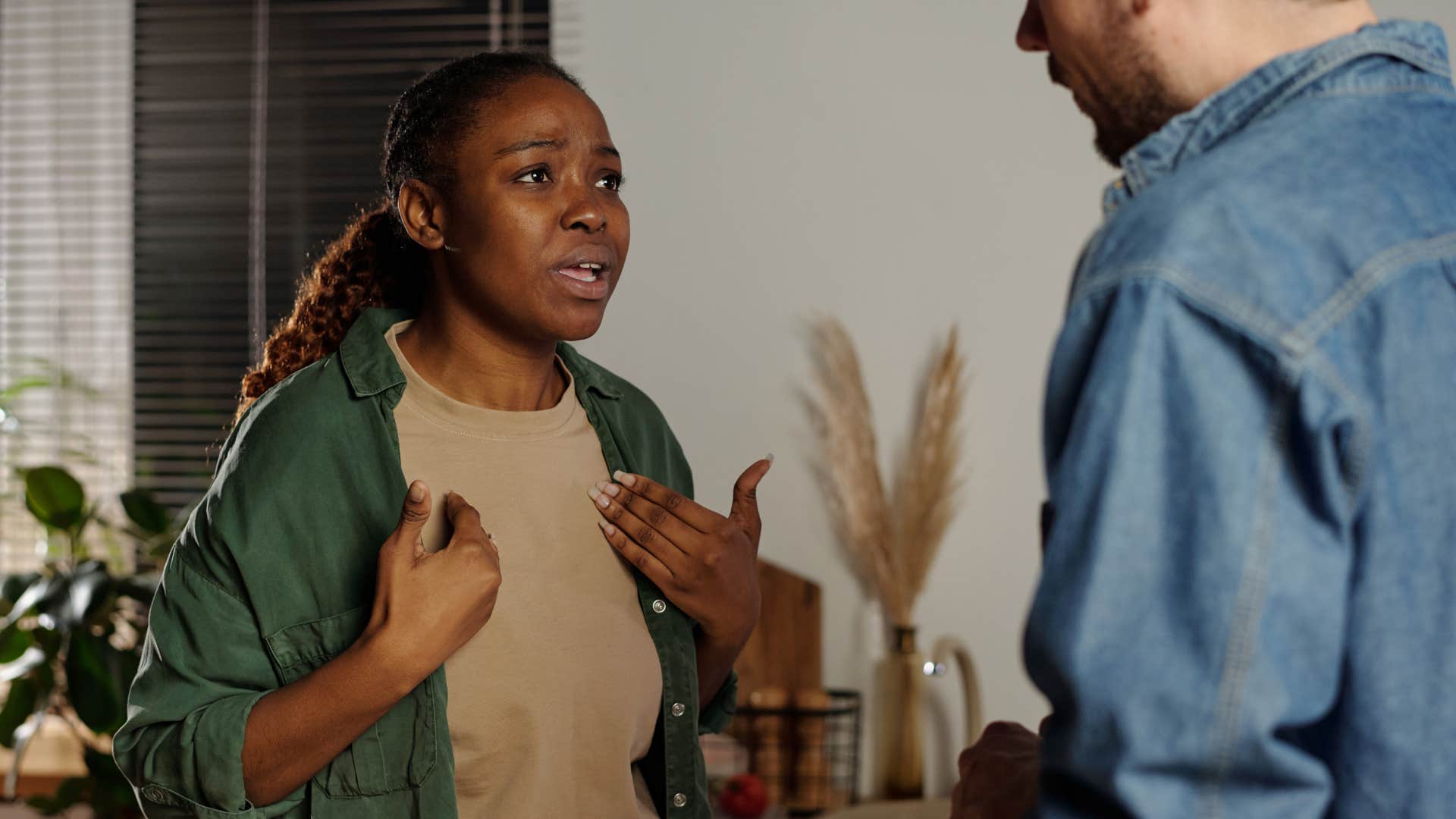11 Sad Signs You’re Giving Way More Than You’re Getting In Return
If you recognize these signs, you must stop over-giving and start pouring into yourself.
 kaanturker / Shutterstock
kaanturker / Shutterstock When you're a naturally giving person, it's easy to fall into self-destructive patterns of over-giving in your relationships. You may become attuned to the emotions of others and go out of your way to meet their needs, possibly neglecting your own. It isn't usually apparent that you are in a nonreciprocal relationship at the start. But over time, you start to see several sad signs that you are giving way more than you're getting in return, and that can be devastating.
It feels good to give to other people. There is nothing more heartwarming than putting a huge smile on the face of a person you love. But when the relationship isn't balanced, tipping unfairly in one direction, it can quietly corrode your self-worth, energy, resources, and your sense of identity. You are pouring into someone else, but they are not refilling your cup. Recognizing the signs of over-giving early can save you some stress and heartache.
Here are 11 sad signs you're giving way more than you're getting in return
1. You are always there for them, but they are rarely there for you
 dimaberlinphotos via Canva
dimaberlinphotos via Canva
If you are a true giver, you might have a history of showing up for everyone around you when times are tough. Whether it's a late-night phone call, a sudden crisis, or just moral support, you are there when the people you care about need you. But when you need someone, you are met with silence, excuses, or last-minute cancellations.
The problem with being the go-to for people you love is that, because you always have answers and energy to give, they see you as the strong one. They unconsciously believe that you will effortlessly get through whatever you are going through, so don't take your cry for help seriously. Surround yourself with people who can see the whole you. Relationships, whether romantic, familial, or platonic, should be reciprocal or they need to end amicably for your own good.
2. You're emotionally drained after every interaction
 Maridav via Canva
Maridav via Canva
Did you know that hearing about the trauma or drama that another person is going through is just as psychologically damaging as experiencing it yourself? It's called secondary or vicarious trauma, and mental health professionals are at an increased risk. Supporting someone else during a challenging time in their life is great. But the support should be mutual, and how it affects you should be taken into consideration.
If, after talking to your loved one, instead of feeling uplifted and more connected, you feel used and emotionally exhausted. They have you on call for all of life's emergencies, and their problems always become your problems. They never inquire about how you're doing or what's going on in your life because they are wrapped up in their own things. It's okay to tell someone you need a break from them or exit the relationship altogether.
3. You find yourself constantly justifying their behavior
 Galina Zhigalova via Canva
Galina Zhigalova via Canva
Your man forgot your birthday, and you're sitting there telling your girlfriends that he is just busy and overwhelmed. Your lady took a girls' trip at your expense on your anniversary, and you explained to your friends that it just slipped her mind. One thing that givers excel at providing is excuses for the problematic behavior of people they love.
Not only are you giving your love, time, and energy, but you also extend endless grace and understanding when you are hurt or ignored. Your intuition is telling you that your partner truly does not value you, so they couldn't care less about acknowledging special occasions with you. But you continue to overinvest in hopes that they eventually live up to the potential you see in them. Trust me when I tell you to cut your losses.
4. Your needs rarely come up in conversations
 Timur Weber from Pexels via Canva
Timur Weber from Pexels via Canva
I used to talk on the phone for hours with certain people, and feel empty when I hung up. It dawned on me that nothing I had called them to talk about had been discussed. Somehow, the conversation immediately shifted to them and their needs, and I found myself playing therapist in an extended session I never asked for. It built quiet resentment, and I eventually stopped answering several people's calls.
Then there are those people who just don't want to hear about your hard times. They might rush off the phone or be distracted as you share your most emotional moments. You get the feeling they aren't listening to understand you, but to either find the perfect moment to end the call or make their own judgments. You deserve to be around people who care about what's going on in your life and try their best to make it easier.
5. You give without being asked, and it's taken for granted
 RDNE Stock Project from Pexels via Canva
RDNE Stock Project from Pexels via Canva
I have over four decades of experience as an over-giver. My family labeled me smart and an old soul when I was still in single digits, and I wore it like a badge of honor. They called me the mini-matriarch, and there wasn't a problem that I didn't have a solution for. My pride in being so entrusted eventually shifted to bitterness when I realized that being there for everyone else was draining the life out of me.
So, I did a hard reset, setting new boundaries and excommunicating anyone who didn't adhere to them from my life. When you notice that a relationship is one-sided, it's important to talk about how to restore balance, or create it if it never existed. People who care about you will want to contribute as much as you do. Those who don't will have to move on without you. It's important to know the difference between supporting and enabling people for your mental health.
When you have a track record of being reliable and anticipating the needs of other people before they ask, gratitude can turn into expectation. They get so used to you filling life's gaps for them that they see your contributions as the norm and nothing to get excited about anymore. They are entitled to your presence and your giving spirit, and it's time to cut off the supply.
6. You feel guilty when you have to say 'no'
 Liza Summer from Pexels via Canva
Liza Summer from Pexels via Canva
As over-givers and empathetic people, we often struggle with just saying no. We often make excuses or overexplain why we've decided not to do something. We are so used to saying yes to every request made of us that saying no seems foreign. So, we end up overextended and internally upset because we never drew a line in the sand to protect ourselves.
But once you realize that you are giving way more than you are getting in return, you understand that "No" is a complete sentence. You let go of the anxiety about whether or not people will still like you if you stop giving in to their every demand. However, if your boundaries send them running, it's likely that they never truly cared about you in the first place. You were simply a resource, and they will move on and find another.
7. You make excuses for why you stay
 Kaboompics from Pexels via Canva
Kaboompics from Pexels via Canva
I'm not ashamed to admit that I indulge in reality TV from time to time. Recently, I was watching Love & Hip Hop Atlanta, and one of the women was told that her husband was sending inappropriate messages to other women. Instead of holding him accountable, she lied and said she was the person sending messages from his account. As sad as that seems, it is not something that is uncommon for people who give more than they receive to do.
When friends or family members question the relationship, over-givers tend to make excuses for the behavior of a partner and for why they choose to stay in such an unfulfilling dynamic. They defend the obvious imbalance in the relationship because they are hanging onto the idea that a person will change. Or maybe they wrongfully believe this is just the way love goes.
8. You're the only one making sacrifices
 Pressmaster via Canva
Pressmaster via Canva
When two people love each other, there are spoken and unspoken agreements that they make about how they will show up in each other's lives. They compromise and make sacrifices to keep the relationship afloat and flourishing. But if you find that the only person willing to give up something for the good of the love you share is you, you are in a nonreciprocal situation.
You adjust your schedule to suit them, you change plans at the last minute to be there for them, or you rearrange your priorities to put them at the top of the list. But all you get in return is a brick wall. It's business as usual for them, no matter what you need, and you have to reach out to other people for help because you are not at the top of their list of people who matter.
9. You start feeling resentful, but keep your mouth shut
 shisuka via Canva
shisuka via Canva
The realization that you are giving way more than you ever receive in a relationship doesn't just happen overnight. It slowly creeps up on you by way of ignored text messages and phone calls, missed appointments, and broken promises. Something in your gut is telling you it's not right, but you continue, pretending to be okay, but silently building up anger and resentment over your unfulfilled needs.
People who give too much tend to suppress their negative feelings about how the relationship is progressing. They don't want to seem selfish or needy, so they just continue to deliver with a smile while seething inside. It's important to listen to your intuition. If you feel something isn't right, it probably isn't. Address and resolve problems with imbalance in your relationship, or move on if you can't.
10. They pull away to make you question your worth
 Alex Green from Pexels via Canva
Alex Green from Pexels via Canva
A person who receives all of the benefits of being around you and gives nothing in return knows just how to keep you giving. If you start to question their behavior, they simply pull away, putting you into "chaser" energy and making themselves the "runner". They distance themselves until you can prove that you have learned your lesson and will continue to accept even less than the bare minimum.
Instead of addressing the problem, taking accountability, and recognizing their lack of effort, they have acted as if you are to blame and left you without closure. You are left to doubt your worth and will do anything to get them back. That desperation causes you to lower your standard even more and keeps you from asking them to reciprocate in the future.
11. You don't even recognize yourself anymore
 JESSICA TICOZZELLI from Pexels via Canva
JESSICA TICOZZELLI from Pexels via Canva
By the end of my sixteen-year relationship, I didn't even know who I was anymore. What did I like and dislike? What were my wildest dreams? I had adopted my husband's aspirations in place of my own and worked hard to help him get to where he wanted to be in life, while he acted as if what I wanted didn't exist. Part of my healing journey was to get to know myself without the labels of 'wife' or 'mother.'
When you give way more than you receive in relationships, you compromise so much of yourself that you eventually lose sight of your own needs, passion, and voice. The muted version of yourself revolves around someone else's comfort, and once they get used to that, it's hard to change. Sometimes, you have to lose everyone around you in order to find yourself.
NyRee Ausler is a writer from Seattle, Washington, and the author of seven books. She focuses on lifestyle and human interest stories that deliver informative and actionable guidance on interpersonal relationships, enlightenment, and self-discovery.

